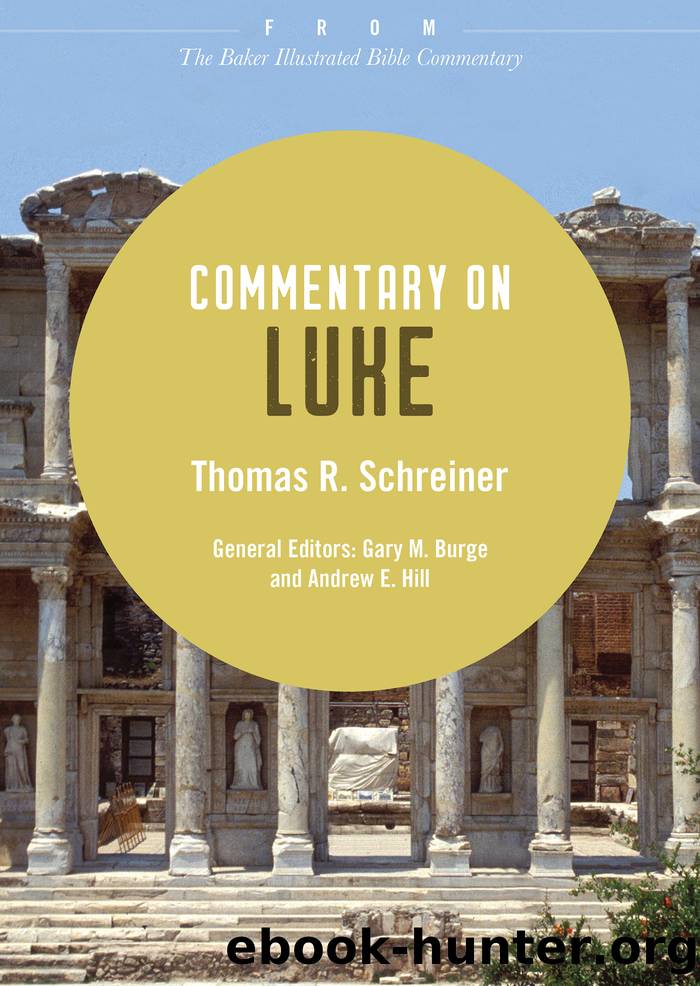Commentary on Luke by Thomas R. Schreiner

Author:Thomas R. Schreiner [Burge, Gary M. and Andrew E. Hill]
Language: eng
Format: epub
Tags: Bible Commentary/New Testament, REL006050, REL006070
ISBN: 9781493424658
Publisher: Baker Publishing Group
Published: 2019-10-24T00:00:00+00:00
In Luke 12:5 Jesus refers to âhell,â or in Greek, Gehenna. This is a translation of the Hebrew for âValley of Hinnom,â which is located on the west and south sides of Jerusalem. The expansive green area in this aerial is the southern part of the valley. Jerusalem burned its refuse here, so it was considered an unclean place and thus to be avoided.
The section on possessions (12:13â34) can be divided into three subsections: (1) warning against greed (12:13â15), (2) the parable of the rich fool (12:16â21), and (3) worry over possessions (12:22â34). In the first paragraph (12:13â15) a man wants Jesus to arbitrate in an inheritance dispute between his brother and himself. This would be typical work for a rabbi. But Jesus refuses, insisting that this is not his role. In verse 15 he warns of the root problem: greed. A greedy person thinks that the good life is found in things, but this is a distorted perspective (12:15). This discussion leads Jesus to relate the parable of the rich fool (12:16â21). The problem with the rich fool is not that he has bumper crops or that he decides to build more storage space (12:16â18). The problem is that he invests his entire life in his possessions (cf. 12:15). He draws all his security from his material goods (12:19) and fails to reckon with God. He is living as if he will never die and has forgotten the importance of spiritual riches (12:20â21). Such a shortsighted investment in temporal things is foolishness indeed. In the last section, Jesus gives his disciples the proper perspective on riches (12:22â34). Believers should avoid anxiety about food and clothing, for true life does not consist in material possessions (cf. 12:15, 21). And if God cares for ravens and adorns flowers with such beauty, then he will provide the fundamental physical needs of believers (12:24, 27â28). Jesus is not suggesting here that work is unnecessary; we need to remember that the problem being addressed here is worry, not laziness. Worry is also senseless because it does not accomplish anything (12:25â26). No one can live even a day longer by worrying. The root problem with worry is lack of faith (12:29). It is understandable that pagans are consumed with the desire for security, but believers need to remember that the Father knows what they need (12:30). If believers make the kingdom their consuming passion, then God will take care of other needs (12:31). Disciples, then, are not to fear but to trust God (12:32). They will not draw their security from possessions, and so they will be free to give their possessions to others. If their treasure (or security) is money, then that will be their consuming passion. Making money oneâs treasure is the path to insecurity, however, because it is always subject to the uncertainties of life (12:33).
From the proper attitude toward money Luke now turns to the way disciples should view the interval between Jesusâs ascension and return (12:35â48). The parable of a
Download
This site does not store any files on its server. We only index and link to content provided by other sites. Please contact the content providers to delete copyright contents if any and email us, we'll remove relevant links or contents immediately.
Fangirl by Rainbow Rowell(9222)
How to Bang a Billionaire by Alexis Hall(8133)
Wonder by R. J. Palacio(8095)
The Thirst by Nesbo Jo(6921)
The Space Between by Michelle L. Teichman(6921)
Assassin’s Fate by Robin Hobb(6193)
Wiseguy by Nicholas Pileggi(5762)
The Night Circus by Erin Morgenstern(5210)
Paper Towns by Green John(5173)
The Kite Runner by Khaled Hosseini(5159)
Bittersweet (True North #1) by Sarina Bowen(4840)
Gerald's Game by Stephen King(4633)
Too Much and Not the Mood by Durga Chew-Bose(4331)
Pillow Thoughts by Courtney Peppernell(4268)
Goodbye Paradise(3795)
Twelve Days of Christmas by Debbie Macomber(3549)
Good by S. Walden(3543)
The Rosie Effect by Graeme Simsion(3454)
The Cellar by Natasha Preston(3328)
